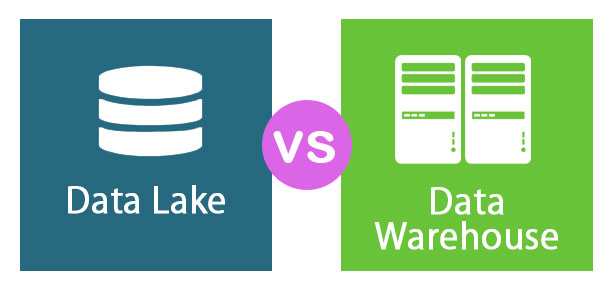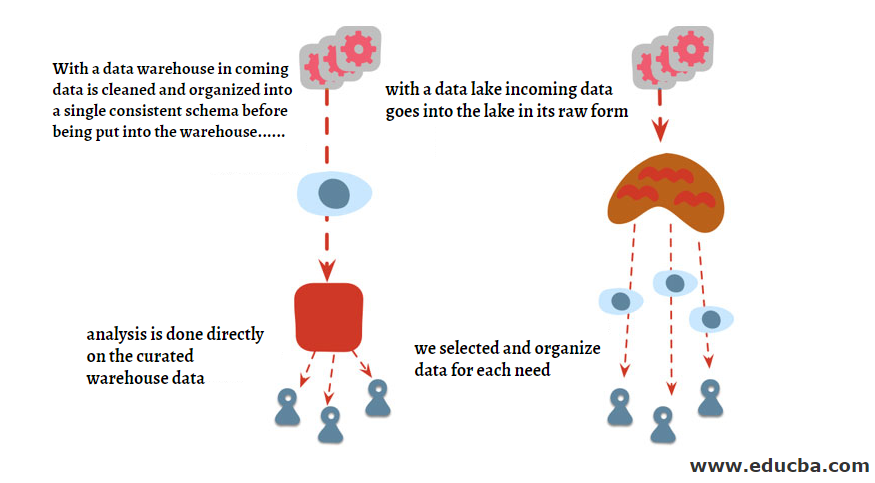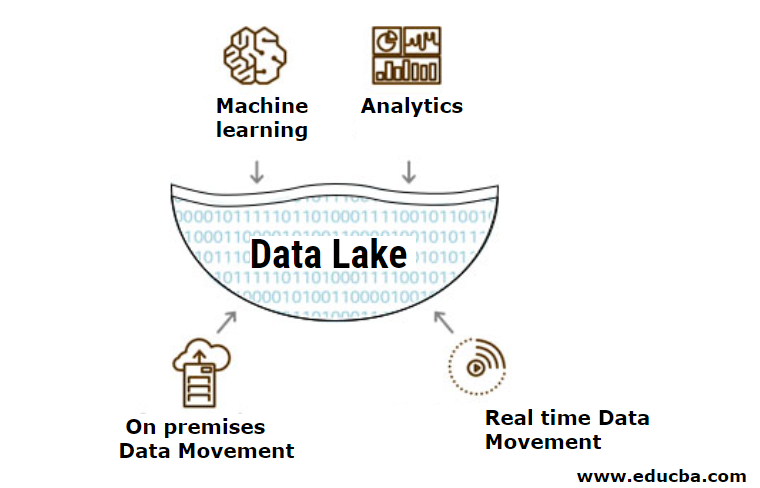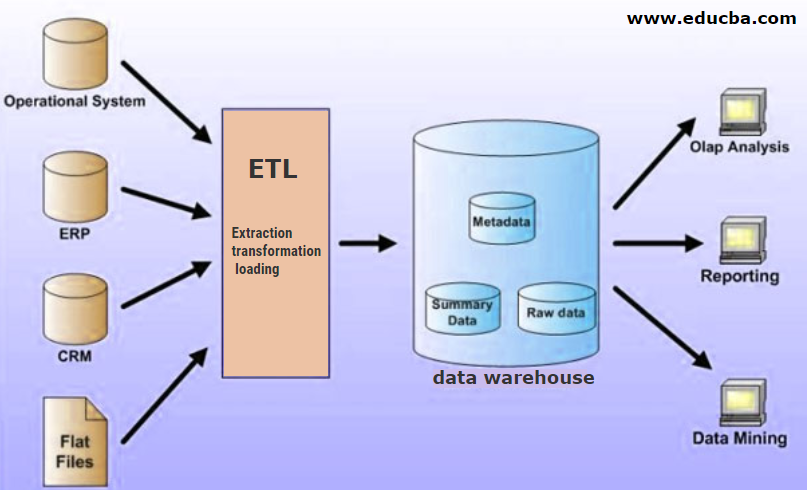Introduction to Data Lake vs Data Warehouse
The following article provides an outline for Data Lake vs Data Warehouse. While both Data Lake and Data Warehouse accepts data from multiple sources, Data Warehouse can hold only organized and processed data and Data Lake can hold any type of data that are processed or unprocessed, structured or unstructured. Data Warehouse is a legacy system, and Data Mart is a recently discovered concept for Big Data Implementation. Data Warehouse processes data using ETL method before storing the data conversely to Data Lake, which uses ELT method for data processing.
What is Data Lake?
A Data Lake is a kind of storage repository that consists of only raw data that is in the form of structured, semi-structured, and unstructured format. The data lake is mostly used by Data Scientists and Machine Learning Engineers as it helps them to answer questions that are not yet answered or perhaps create a question that is not yet known. It contains a vast pool of data with different types and when they are integrated, they prove to be very useful in terms of predictive modeling which is mostly used to build machine learning models.
What is a Data Warehouse?
A data warehouse is a centralized location for storing the transformed data that is made into a structured format before storing it into the data warehouse. It can have data from multiple data sources which are loaded using the ETL process to the warehouse and then used for Business Intelligence purposes.
Head to Head Comparison Between Data Lake vs Data Warehouse (Infographics)
Below are the top 14 differences between Data Lake vs Data Warehouse:
Key Differences Between Data Lake vs Data Warehouse
- It consists of unstructured and structured data from different platforms such as sensors, applications, and websites, etc. It mostly consists of relational data from RDBMS, DBMS systems, and other operational databases and applications.
- Data Lake is schema-on-read processing. The data warehouse is schema-on-write processing.
- It is highly agile. It is less agile.
- The configuration is easy and can adapt to changes. It has a fixed configuration and is very difficult to change.
- It is mostly used by AI scientists and Machine Learning professionals. It is being used by business professionals.
Comparison Table Between Data Lake vs Data Warehouse
Let’s discuss the top difference:
| Characteristics | Data Lake | Data Warehouse |
| Storage | Data is kept in its raw form in Data Lake and here all the data are kept irrespective of the source of the data. They are only transformed into other forms whenever required. | Data Warehouse is composed of data that are extracted from transactional and other metrics systems. Here the data is not in raw form and is always transformed and clean. |
| Use and Purpose | The main target for Data Lake is Data Scientists, Big Data Developers, and Machine Learning Engineers who need to do to deep analysis to create models for the business such as predictive modeling. | The main target of Data Warehouse is the operational users as these data are in a structured format and can provide ready-to-build reports. So they are mostly used for business intelligence. |
| Data Inputs | The main inputs to data Lake are all kinds of data such as structured, semi-structured and unstructured data. These data reside in data Lake in their original form. | The main inputs to Data warehouse are structured data that are coming from transactional and metrics systems which are then organized in the form of schemas. |
| Data Quality | Comprises of raw data that may or might not be curated. | It consists of curated data which is centralized and is ready to be sued for business intelligence and analytics purpose. |
| Normalization | Here the data is not in normalized form. | Denormalized schemas. |
| History | The technologies that are used in data lakes such as Hadoop, Machine Learning are relatively new as compared to the data warehouse. | Here the technology that is used for a data warehouse is older. |
| Timeline of Data | A data lake can have all kinds of data and can be used with keeping past, present and prospects in mind. | As far as Data Warehouse is concerned, here most of the time is spent on analyzing various sources of the data. |
| Processing Time | Here the processing time while analysing and getting results from data Lake is much smaller than that of Data Warehouse because here the data are stored in the form of raw data and those are not in transformed format and as a result of which we cut off the time that might be getting spent on transforming of the data. We can just pick up the data as it is and do some basic cleaning and start building our models. | In the case of Data warehouse, the time that is consumed to process is more as compared to the data lake. The reason for this is that the data in any data warehouse first needs to be transformed and then it can be analyzed. |
| Cost of Storage | The cost of storage here in data lake technologies is relatively lower than that of Data warehouse and are less time consuming as well. | The cost of storage in data warehouse technologies is more as compared to the data lake. This is because it needs more storage for the transformed data as it first needs to store the raw data and then transform them to assign various fields according to the structure of the Data Warehouse. |
| Compatibility | Here data is always kept in its raw format and is only transformed when required or when it is ready to be used. | Here the data is stored in transformed format and we may face problems when we try to make any changes. |
| Accessibility | Data inside the data lake are highly accessible and can be quickly updated. | Data inside the data warehouse are more complicated and it requires more cost to bring any changes to them, accessibility is also restricted only authorized users. |
| Position of the Schema | Schema is mostly created after the data is stored. This brings high agility. | Here the schema is mostly created before the data storage. |
| Process of Processing | The data lake makes use of the ELT process i.e. Extract, Load and Transform. | The Data warehouse uses the traditional approach of ETL i.e. Extract, Transform and Load. |
| Benefits | Data lake leads to new inventions as the integration brings together different types of data and it also brings answers to many unanswered questions. | Most of the organizational users are involved in operational activities and data warehouse provides one such brilliant platform to create reports and metrics on top of transformed data. |
Conclusion
In this post, we saw about Data Lakes vs Data Warehouse. We also went ahead and compared both of these based on different parameters. This should help any learner to get a basic idea behind the technologies that are supporting Data Lake and Data Warehouse.
Recommended Articles
This has been a guide to the top difference between Data Lake vs Data Warehouse. Here we have discussed the key differences with infographics and comparison table. You may also have a look at the following articles to learn more –







